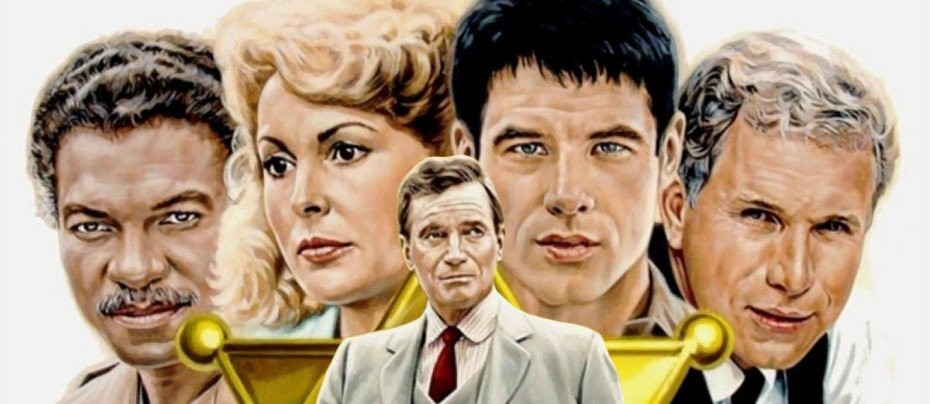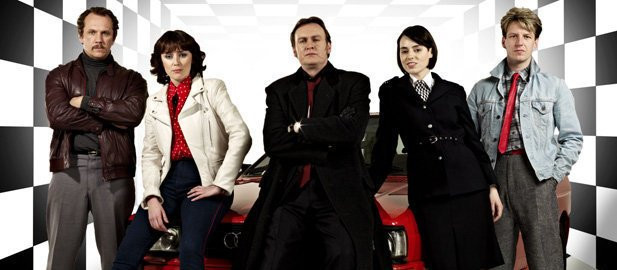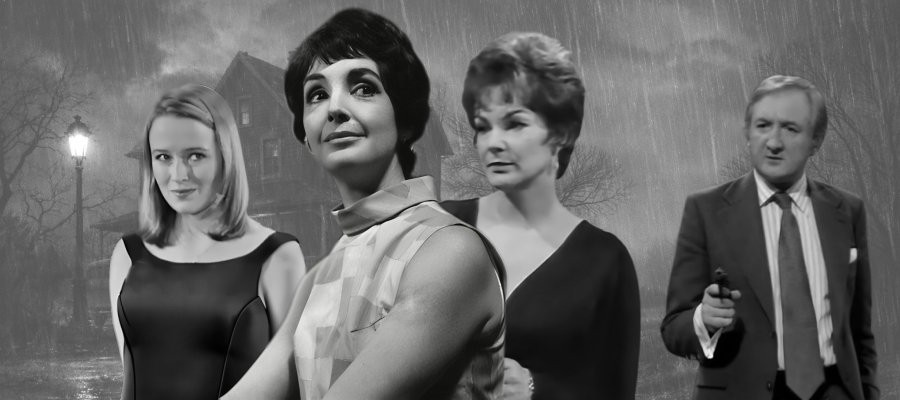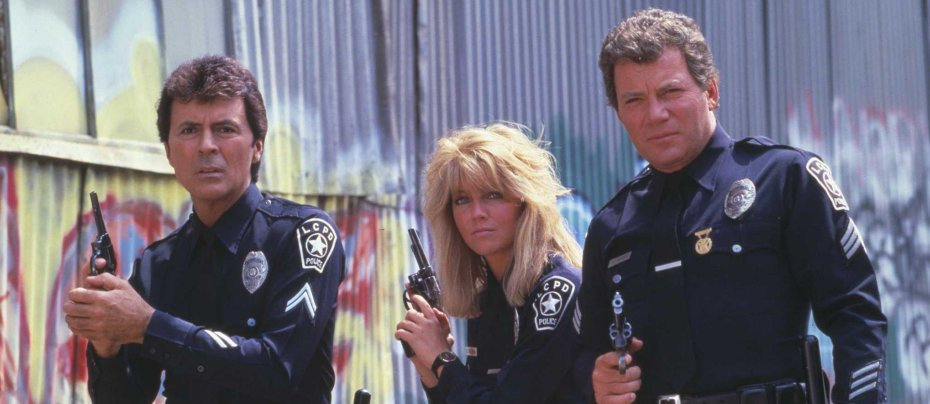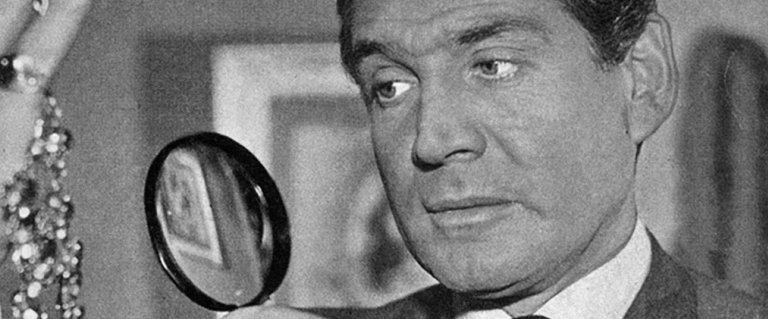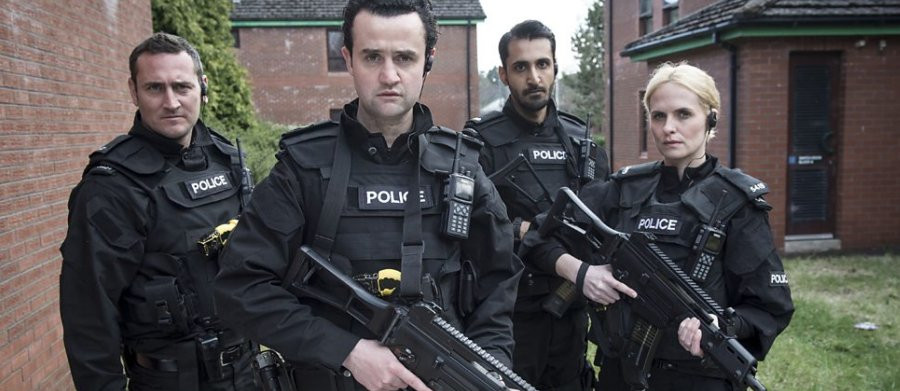
Line of Duty
Article by Andrew Cobby
At 8.59pm on Thursday 28 April 2016 I prayed. It was the first time I had prayed since my time as an altar boy. Dear God, I said, I know you let me down at Christmas 1974 when I asked for a Rolf Harris Stylophone and I forgive You for that but please don’t let it be Superintendent Ted Hastings. Please don’t let Ted Hastings be the puppeteer who’s been jangling The Caddy on a string for the last few weeks.
I am, of course, referring to Line of Duty, the BBC’s police procedural. Written by Jed Mercurio it’s into its fifth series now and, I’m ashamed to say, I missed the first two. The Caddy is an underworld figure, presumed to be a rogue policeman, who spends most of Series Three leading Ted Hastings and his team on a merry dance. He is so called because he was recruited to the dark side while caddying for some shady characters on the golf course.
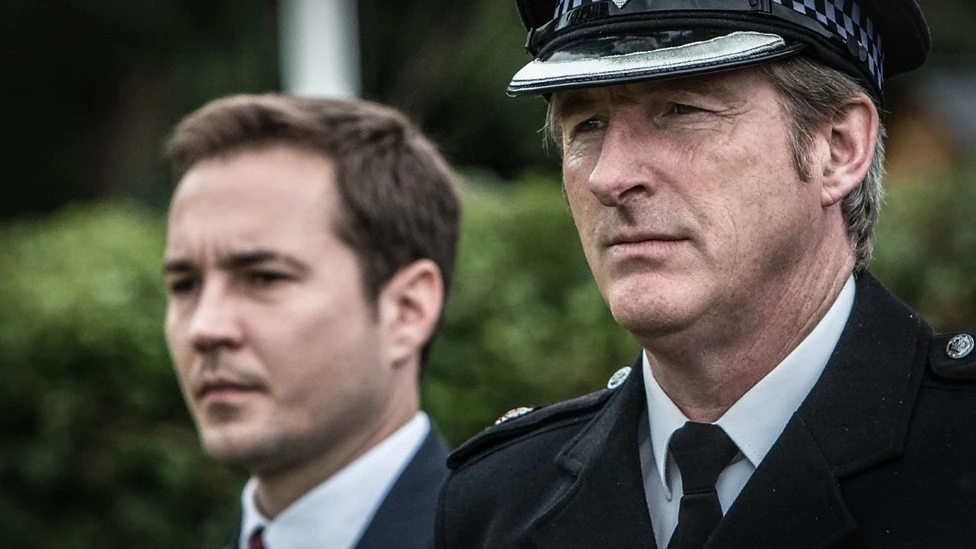
I thought for a while that Ted Hastings would join Ted Burgess from The Go-Between and, er, Father Ted in the canon of doomed fictional Teds. I was foolish to doubt him because, in the final episode, he showed himself to be the incorruptible police officer I hoped he would be. Played by the estimable Adrian Dunbar, Superintendent Ted Hastings has skilfully navigated the good ship AC-12 through the treacherous waters of historic child abuse, police cover ups and DS Steve Arnott’s dodgy accent. AC-12 is the police anti-corruption unit based at South Ferry Police Station. They investigate their own.
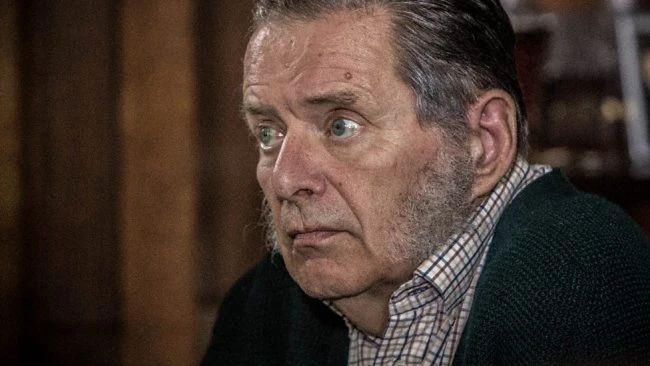
A Northern Irishman and staunch Catholic, Ted has the endearing trait, when stressed, of referencing the holy family and addressing colleagues as ‘Son’. Just when it looked like Ted was about to let Masonic loyalties get in the way of his questioning of retired Superintendent Fairbank, he let him know that he didn’t believe his convenient memory lapse. Fairbank must have something to hide. He’s played by George Costigan, for God’s sake, sideboards and all. My wife has always mistrusted any character played by this notable actor ever since she witnessed his role as the male third of the adulterous trio Rita, Sue and Bob Too. In a previous episode the investigators unearthed a picture of Fairbank with an unnamed Jimmy Saville and an overweight councillor by the name of Dale Roach. Hmmm, Dale Roach, Rochdale, big extravert politician, I think I know where they’re going here. An article like this is not the place for a heavyweight discussion about the heinous crime of child abuse but I will say that old sins have long shadows and what we do to our children, however long ago, throws a dark shadow over us all.
Jonas Armstrong puts in a brief but noteworthy performance as Joe Nash, one of the victims of abuse. The scene in which he hugs his daughter is a memorable one. In the midst of a bleak tale it’s a necessary reminder that, if violence, corruption and death are powerful things, then so is love. Also memorable is the scene in which he throws up on being shown a picture of Fairbank. After seeing this the viewer is left in doubt as to Fairbank’s guilt and this viewer in particular had to concede that his wife’s appraisal of any character played by George Costigan was a very perceptive one. Not that I told her that.

It all kicks off with the cold-blooded murder of a fleeing criminal by Sergeant Danny Waldron, played by Daniel Mays. Just for good measure Waldron goes on to torture and murder one of the criminal’s associates and deposits the head in a storage unit.
Waldron is a good example of how the programme makes the viewer revise its opinions of a character. Only a heartless monster would shoot a man who is on his knees with his hands up and then go on to torture and behead someone else. When we learn that Waldron was abused as a youngster by the man he had just killed his actions become, if not more excusable, then at least more human. What would you do in such circumstances? What would I do?
There wasn’t much time for Danny to examine his conscience as he was shot dead at the end of episode one, by one of his own team who had been nobbled by The Caddy. Other characters in Danny’s firearms team fare little better. PC Rod Kennedy is found hanged, PC Hari Baines is imprisoned for his part in Danny’s death and PC Jackie Brickford is thrown off the force when she finally confesses to the conspiracy to kill Danny Waldron. It’s a hard life if you don’t weaken.
Waldron’s death reveals another truth about Line of Duty– it knows it’s good. It is a confident programme indeed that chooses to dispatch a charismatic actor like Daniel Mays by the end of episode one. It is almost on a par with Drew Barrymore meeting her maker within minutes of the start of Scream. If Line of Duty was a golfer it would be Sevvy Ballesteros in his pomp, approaching the tee with a swagger knowing that he is going to annihilate the opposition and there’s not a single thing the opposition can do about it.

Little terrier DS Steve Arnott and his sidekick DC Kate Fleming have been on the trail of The Caddy all series. Arnott is a Southerner played by Scottish actor Martin Compston and this would explain Arnott infrequently emitting some strange vowel sounds. Compston is a good actor, though, and he delivers a highly watchable performance. Equally good is Vicky McClure (I wonder if she is any relation to the late, great Doug) as the confident, androgynous Kate Fleming. For the purposes of a later joke, I like to think of her as the Annie Lennox of AC-12.
As a bent policeman, The Caddy has been helping to cover up historic child abuse at a children’s home carried out by pillars of society including local councillors and high-ranking policemen. As this is a programme for adults it throws information at the viewer at a rapid rate of knots. This isn’t always a good thing as it can lead to confusion for those not paying attention. At one point I was so confused that I even thought I was The Caddy. It was only when I found myself burying my mobile phone in the back garden that I realised that I had an alibi for my whereabouts between 9pm and 10pm on the previous Thursday - not a watertight alibi but one that should keep DS Arnott off my leg until the real Caddy is unmasked.

I needn’t have worried because The Caddy was revealed to the viewer half way through the run to be Detective Inspector Matthew ‘Dot’ Cottan. He was skilfully portrayed by Craig Parkinson who, as the series progressed, conveyed the frustration and fear of a character coerced into something so long ago that it is too late to change and the only alternative to remaining a corrupt policeman is death. There is a great, claustrophobic scene in episode three in which Cottan watches Lindsay Denton’s release from prison on TV and is then the ringtones on his numerous mobile phones going off simultaneously. Those controlling him are all too aware that she has information that could seriously damage their freedom. It painted a convincing picture of a man so isolated he might as well have been in solitary confinement, with the walls closing in. He still knows how to protect his own position, though, by slyly pointing the finger at DS Arnott as being The Caddy. So successful is he that Arnott’s erstwhile ally DC Fleming was beginning to have serious doubts. She almost succumbed to Cottan’s charms when he turned up on her doorstep with a bunch of flowers and a sad, drippy look before seeing sense and sending him on his way with a couple of verses of Thorn In My Side.

Disgraced Detective Inspector Lindsey Denton has no illusions about Cottan. Recently released from prison for her part in a conspiracy which saw her colleagues killed in an ambush (this took place in Series Two so the details are necessarily sketchy as I haven’t seen it), DS Arnott turns to her for help. Denton still bears Arnott a huge grudge because of a one night fumble they had that he subsequently denied because it took place when he was undercover.
Anyway, she may have been side-lined in prison for a couple of years but she still has all her detecting skills intact. Using her copper’s instinct, Denton soon works out that Waldron, probably knowing that he was in danger, had electronically stored a list of names of abusers that he had been compiling. Cottan had destroyed the hard copy and hoped that no more would be heard of it.
I must give a word of praise here for Keeley Hawes. In a programme full of great performances, she stands out. She puts in a great shift over the course of three episodes as the plain, no-nonsense Denton. You should see how she handles an errant, frisky probation officer in episode four, sending him away with a flea in his ear and a boot in his backside. You go, girl. Ms Hawes sports a fringe that her usual glamorous characters wouldn’t be seen dead with. Unfortunately, Denton soon was, blown away by an increasingly desperate Dot Cottan with DS Arnott’s gun in DS Arnott’s car at the end of episode five. A great scene, this. The viewer knew that it was going to end badly for one of them and, with still one episode to go and the police as yet ignorant of The Caddy’s true identity, the viewer also knew it wasn’t going to be Cottan. So long then, Lindsay. You were positively misunderstood, most definitely deluded (did you really expect to get your job back after serving a prison sentence for corruption?) and quite possibly the best character to show up in TV land for a long while.
I don’t know if you have seen the Hitchcock film Vertigo, at the end of which the James Stewart character has a lot of explaining to do. Well, at the end of this scene DS Arnott has a lot of explaining to do.
A ghostly Denton turns up in the final episode as a figment of Cottan’s guilty conscience. I suspect the writer had Banquo’s ghost in mind at this point and it made me feel quite nostalgic for the days when I studied Macbeth at sixth form college. There were no such hauntings for Cottan after he killed PC Rod Kennedy and quite right too. Rod, for all his reliability, was as miserable as sin and if Cottan hadn’t killed him it was only a matter of time before someone else did. His wife, probably.
For the time being at least, Ted Hastings has managed to deflect the romantic attentions of hard as nails police lawyer Gill Bigelow. It took some doing. He almost weakened when she invited him in for coffee at the end of an evening out. After a quick kiss he remembered that he was a Catholic married man. ‘Jesus, Mary and Joseph, son. If what yee’re osking mee to doy is what Ee think you’re osking me to doy, Ee can’t doy it, son. Eem a married mon’, he explained to her, only in a more convincing Northern Irish accent.
For all the promise of guilt-laden sex on offer, I think Ted is starting to revise his opinion of Bigelow. He began to see the light with the episode of the redacted files. For a good half hour I was convinced that this was police slang for haemorrhoids and wondered why Ted didn’t get himself off to the chemist sharpish. But I was wrong. Bigelow had handed him a file about an earlier, relevant investigation that proved to be worthless because everything was blacked out. As much a PR merchant as a lawyer, Bigelow’s view is that AC-12 should catch some corrupt policemen but not too many as it would make the police force look bad. Such a view is at odds with Ted’s puritan outlook but it helps to explain why she has not over-exerted herself to resolve the child abuse case and subsequent cover up. She is compromised to such an extent that, in the final episode, she is having to review her position. Ted gives her both barrels with the words ‘There’s a line, it’s called right and wrong, and I know which side my duty lies’. As if to emphasise the point, Ted also tells her he knows which side his bread is buttered, which side of the bed he got out of this morning and, unusually for an Irishman, which side is going to win this season’s county championship. He may have the upper hand at the moment but I think Ted should be wary of Bigelow in any future series. As a woman scorned, she could prove to be Uncle Ted’s nemesis and he may well join that list of doomed Teds after all.

Most of the final ninety-minute episode was spent in the interview room and it provided riveting viewing. DS Arnott was quizzed about the death of Lindsay Denton and was banged up in a cell because Cottan, as one of his interviewers, was only too eager to deflect suspicion. How soon the tables turn. Hastings and Fleming went on to interview Cottan as they had received incriminating information about him from the equally corrupt DC Nigel Morton. Morton was played by Neil Morrissey who, in the few scenes he had, managed to convey deviousness and deception to a convincing degree. Previously specialising in laddish roles in the likes of Men Behaving Badly and Boon, Morrissey brings a surprising depth to the role of Morton, a weary policeman playing the system to the end and limping his way to a pension and a disability allowance to which he isn’t entitled.
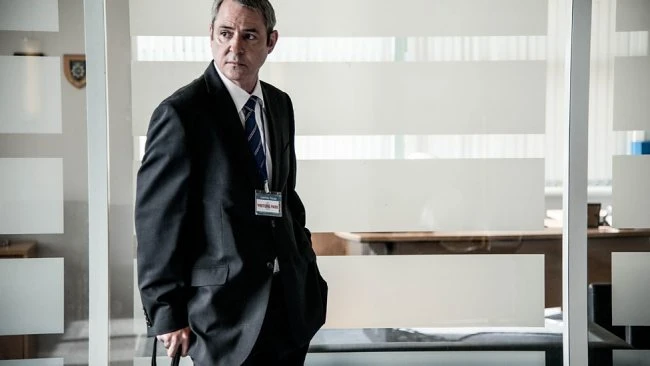
There was an intriguing scene in episode five in which DC Fleming approached another anti-corruption unit and asked for permission to go undercover to investigate possible wrongdoing within AC-12. It was not made clear who the suspect was but it could well be that she was at last beginning to see through Cottan.
Wearing a tight fitting royal blue suit that is currently in vogue (in other words, everyone’s wearing them) Cottan’s chirpy, confident demeanour was slowly eroded as it dawned on him that he had found himself in a situation he couldn’t talk his way out of. If this was an episode of The Clothes Show his suit would have won rave reviews for being bang on trend but Ted Hastings and Kate Fleming were not so shallow.
In the same way that a judge in any good court room drama has to demand to see one of the opposing lawyers, the maverick one, in his chambers, no police procedural is complete without someone saying ‘For the benefit of the tape…’. This occurred several times over the course of the six episodes and, not wanting to feel left out, I’ll even throw in one of my own - for the benefit of the tape, Cottan had the smug smirk wiped off his face by the dynamic duo with about fifteen minutes of the final episode to go. This is where it descended into routine thick ear which took the viewer all the way back to the opening minutes of the first episode. Cottan texted the corrupt firearms officer standing guard to spring him from the interview. With DS Arnott biding his time in a police cell, it was left to Kate Fleming to save the day. Armed with a huge, frightening looking machine gun, she chased Cottan hither and thither until he was picked up by a black four by four. Undaunted by having to lug the gun through the streets, Kate continued to give chase. I must say it was the most ungunlike gun I have ever seen.
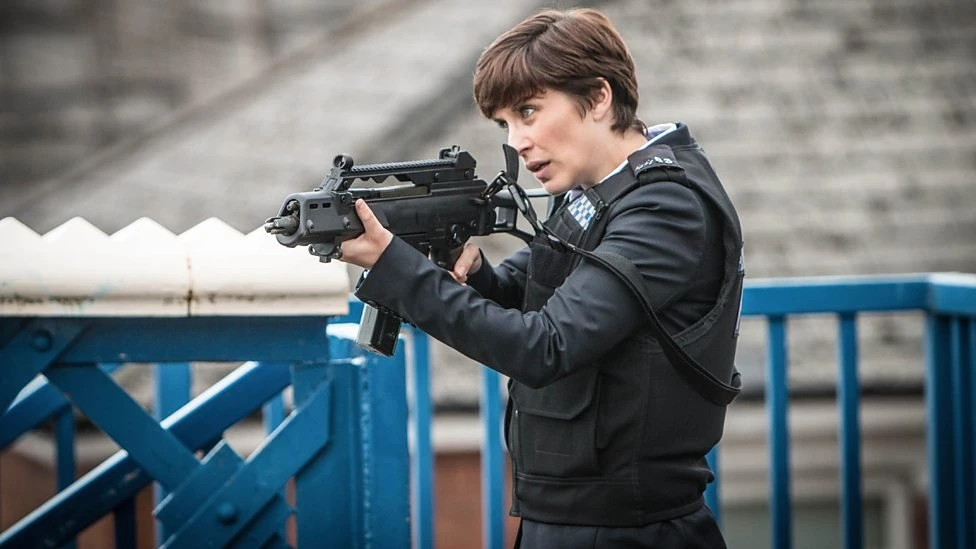
I remember watching the film Westworld a few years ago in which the robots develop a mind of their own and start indiscriminately killing humans. Like these robots, Fleming’s sleek and sinister hi-tech weapon looks the type to go postal and quite cheerfully kill without any human intervention at all. One miraculous shot later and the four by four was brought to a stop. Whether Fleming pulled the trigger or the gun just felt like making its presence felt I couldn’t say. Cottan valiantly put himself between Kate and a fusillade of bullets fired by one of his cronies. Before expiring, he uttered a dying declaration that would forever damn Superintendent Fairbank. Cottan’s last words to Fleming were ‘Please can you take this suit to the dry cleaners for the blood and the invisible menders for the bullet holes because it cost me a lot of money and I want to be buried in it. Cheers.’ I have rarely seen a fashion victim so resigned to his fate.

So that was it. Cottan, the middle man, was dead but we still don’t know who was pulling his strings. He died showing some humanity by protecting Kate Fleming but, as he was no longer any use to them, his masters would probably have killed him anyway.
I am happy with the ending we were given but my flippant side wanted the finale to consist of a dance off between Arnott and Cottan, similar to the one performed by the same actors at the end of Soulboy. A victory for Cottan would lead to his being promoted to Chief Constable while a victory for Arnott means that he gets to wear the sexy royal blue suit.
I thought I would see nothing sadder than Danny Waldron’s funeral, attended only by DS Arnott but this was trumped by the sight of the Lindsay Denton’s grave and the on-screen caption that she had been given a local authority funeral at which no mourners were present. To rub salt into the wounds, the Coroner praised her significant contribution in bringing down The Caddy and exposing abuse in children’s homes. That’s all very well but it’s no good to her up there is it? During her time on earth Lindsay was an exponent of the fine words butter no parsnips school of thought and I can picture her banging on the pearly gates demanding to be let out so that she can show the Coroner what he can do with his significant contribution. You go, girl (have I said that already? Being a cheerleader for a dead policewoman certainly plays havoc with the memory. I sometimes forget that she’s fictional). Waldron and Denton lived sad lives and having no one to grieve over them meant that they had sad deaths too. Life and death, eh? Neither of them are very fair sometimes.
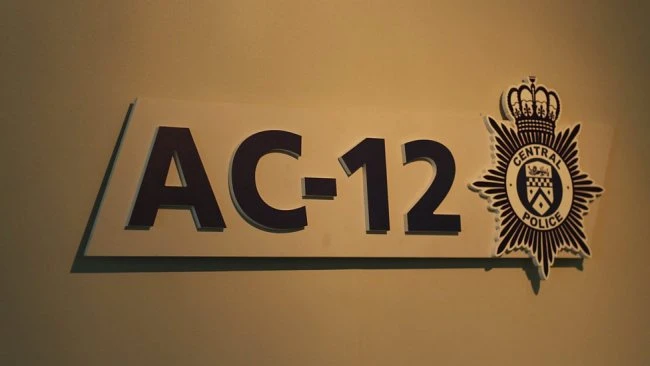
The police officers in Line of Duty inhabit a world that George Dixon wouldn’t recognise because the whole point of modern police shows is to remind the viewer that the warm, secure world of Dock Green no longer exists. We can still learn something from the past though. George Dixon got another twenty-odd years’ worth of episodes down Dock Green way after being pumped full of lead by Dirk Bogarde in The Blue Lamp. I don’t think it wouldn’t be asking too much to expect that Lindsay Denton should also be allowed to rise Lazarus-like from the dead. I feel another prayer coming on. Dear God, I know I have lapsed since my days as an altar boy, but if you could see your way clear to getting Lindsay Denton her own show I would be very grateful. It would be a huge hit and could be called Beyond the Fringe, no, wait, that title’s been used before. How about Fringe Benefits……..Amen.
Published on October 29th, 2019. Written by Andrew Cobby for Television Heaven.



